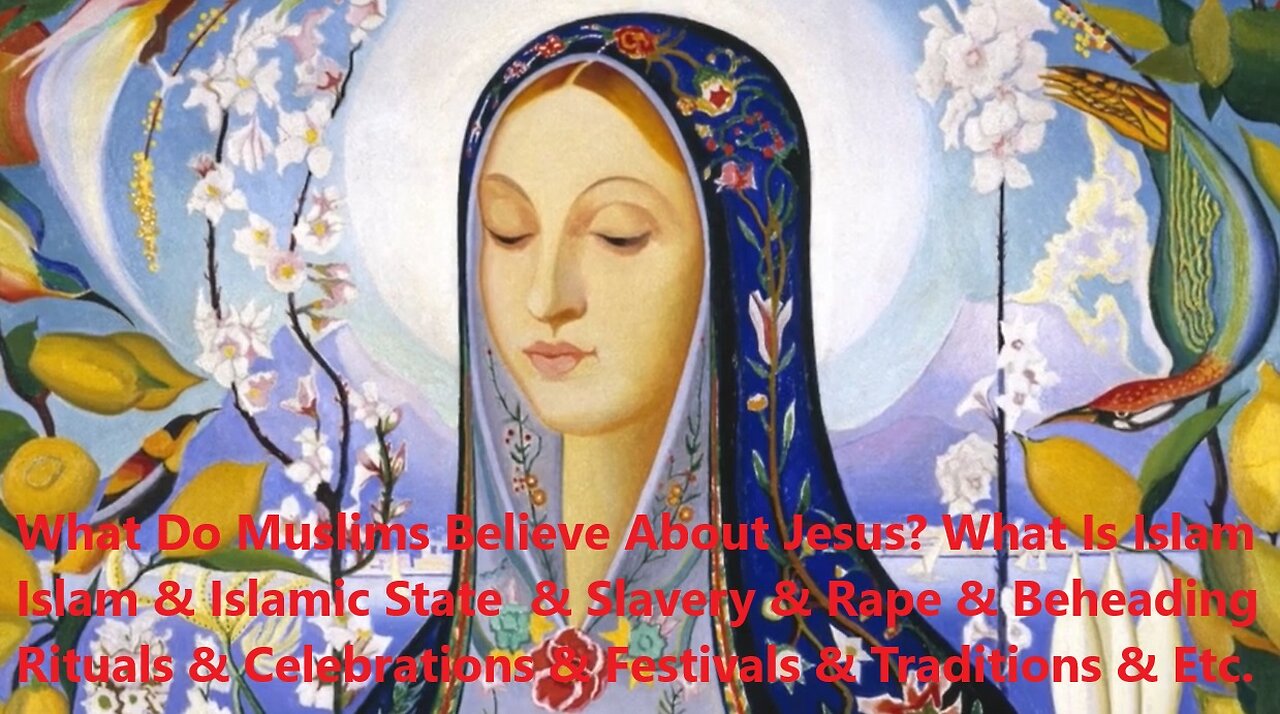Premium Only Content

What Do Muslims Believe About Jesus ? What Is Islam ? Islam And Slavery And Rape ?
What Do Muslims Believe About Jesus? What Is Islam ? Islam & Islamic State & Slavery & Rape & Beheading Rituals & Celebrations & Festivals & Traditions & Etc. We will provide a detailed exploration of Islam, one of the world's major religions, and delve into the core beliefs and practices that shape the lives of Muslims around the globe. We'll start by introducing Islam as a monotheistic Abrahamic faith, tracing its origins to the 7th century in the Arabian Peninsula with the Prophet Muhammad. We'll explain the fundamental acts of worship known as the Five Pillars, including Shahada (faith), Salat (prayer), Zakat (charity), Sawm (fasting), and Hajj (pilgrimage to Mecca). The Quran: We'll explore the holy book of Islam, the Quran, discussing its significance, structure, and its role in guiding the lives of Muslims.
Prophet Muhammad: Learn about the life and teachings of Prophet Muhammad, the last prophet in Islam, and his role as a model for Muslims.
Beliefs in Allah: Understand the Islamic concept of God, Allah, and the importance of monotheism in the faith. Islamic Jurisprudence (Fiqh): We'll touch on Islamic law, or Sharia, and how it informs daily life, including family, ethics, and social interactions.
Diversity in Islam: Explore the various sects and schools of thought within Islam, such as Sunni and Shia, and the cultural diversity among Muslims.
Islamic Rituals and Celebrations: Delve into the religious festivals and traditions observed by Muslims, including Eid al-Fitr and Eid al-Adha . Common Misconceptions: Address misconceptions and stereotypes about Islam and Muslims, promoting a better understanding.
Islam in the Modern World: Discuss how Islam has evolved and adapted to contemporary issues and challenges.
Conclusion and Respect: Emphasize the importance of respecting and understanding different faiths and cultures, fostering tolerance and interfaith dialogue. By the end of this video, you'll have a comprehensive understanding of Islam and what Muslims believe, enabling you to appreciate the richness and diversity of this global religion.
What Do Muslims Believe About Jesus ? A major misconception about Islam is that it’s religion with scary, foreign ideas. The truth is, Islamic beliefs, for the most part, are a continuation of the other Abrahamic faiths, Judaism and Christianity.
Our prophet Muhammad was the last of the prophets, which included Noah (Nooh), Abraham (Ibrahim), Moses (Musa), Jesus (Isa) and Adam (conveniently, also Adam!), the first man and prophet of all creation. We believe that the prophets came, not to change the basic belief in one God (or Allah in Arabic), but to confirm and renew it.
In the spirit of Easter festivities, I thought I would pay my respects to Jesus, the last prophet of Islam before Muhammad, may peace me upon them all. This is not an attempt to ‘disprove’ anyone else’s beliefs. Rather, I am summarising the view of the majority of Muslims.
In Islam, Jesus is not a God or son of God. He is a prophet and messenger, sent to the Jews to reinvigorate their belief in God. In the Quran, Jesus is referred to by his name and is also called ‘the Messiah’, ‘a Spirit from Him’, ‘Servant of God,’ and ‘Prophet of God’ and ‘Distinguished in this World and the Hereafter’. We believe that his followers were ‘Muslim’, that is, those who surrendered to God.
We believe in the immaculate conception of Jesus and do not believe that Mary (Mariam) was ever betrothed or married Joseph the Carpenter. In fact, there is no solid mention of Joseph in Islamic literature that I could find (interestingly, my dad was helping me do some research and we found an Arabic, Catholic Encyclopaedia which said that Joseph the Carpenter was 77-87 years older than Mary) .
Surat Mariam, is the Quranic chapter on Mariam and the birth of Jesus. Archangel Gabriel comes to tell Mariam that she is pregnant. Then this happens: https://unveiledthought.com/2014/04/19/what-do-muslims-believe-about-jesus/
Mariam goes on to give birth to baby Jesus, supported by a palm tree of dates and a small river at her feet. When she took her baby back home, she was faced with people’s questions. Baby Jesus spoke, and amongst other things said: https://unveiledthought.com/2014/04/19/what-do-muslims-believe-about-jesus/
He was a man of many miracles, with God telling us in 3:49 that Jesus could shape a bird out of clay, and with the power of God, would breathe life into it. He cured the blind and leper and give life to the dead, by the grace of God.
So far, you can say that the Islamic and Christian beliefs differ only in the deity of Jesus – we believed in his miracles, but believed they were a sign of his prophethood.
The most prominent difference comes in what we believe at the end of Jesus’s life. Muslims do not believe that Jesus died on the cross. In fact, we don’t think he died at all. In Surat Al Nisa (The Women), God says: https://unveiledthought.com/2014/04/19/what-do-muslims-believe-about-jesus/
The Islamic belief is that when it became known that Jesus was to be crucified, a student of Jesus volunteered to take his place on the cross. The story goes a little something like this:
“Just before Allah raised Jesus to the Heavens, Jesus went to his disciples, who were twelve inside the house. When he arrived, his hair was dripping with water (as if he had just had a bath) and he said, ‘There are those among you who will disbelieve in me twelve times after you had believed in me.’ He then asked, ‘Who among you will volunteer for his appearance to be transformed into mine, and be killed in my place. Whoever volunteers for that, he will be with me (in heaven).’ One of the youngest ones among them volunteered, but Jesus asked him to sit down. Jesus asked again for a volunteer, and the same young man volunteered and Jesus asked him to sit down again. Then the young man volunteered a third time and Jesus said, ‘You will be that man,’ and the resemblance of Jesus was cast over that man while Jesus ascended to Heaven. When they came looking for Jesus, they found that young man and crucified him.”
We believe that Jesus will return towards the end of time, preceded by a false messiah and an increase in unrest amongst humanity – more crimes, more hate, more war and more disease. We believe that he will come back to save us from ourselves and preach the oneness of God, as he did when he was a prophet. It is said that he will live 40 years and then will die.
Muslims hold all prophets in high regard and respect Jesus as much as we respect Muhammad. We believe that he was sent as a mercy to mankind.
Presentation on theme: "Warm up With your partner,"— Presentation transcript:
1 Warm up With your partner,
Brainstorm a list of six (6) words and/or phrases that come to mind for the religion of Islam.
Please be appropriate.
2 The “BIG THREE” Religions
3 ISLAM
4 Islam Summary
Islam is by far the most prominent religion in the Middle East
People who practice Islam are called
“ Muslims “
Islam is a very strict religion
Islam is a “Monotheistic” religion
Allah is the one true God and Mohammed is his last Prophet.
It is against Islamic law to have any image of Allah or Mohammed. No images of either exist.
5 Introduction
Islam is a religion which is second only to Christianity in size and is prevalent in all corners of the world.
It was founded by Mohammed (AD 570 – 632) who was born in Mecca in Saudi Arabia and was to become ‘the seal of the prophets’.
After revelations from God (Allah), Mohammed went on to preach the religion of the one absolute God
6 Size and Location
Originating in Saudi Arabia, Islam has spread throughout the world and there is an estimated 1.1 billion Muslims in the world.
Historically Islam has been more dominant in Asia and Africa and countries with a high population of Muslims are Indonesia, Pakistan and Saudi Arabia.
8 Origins Summary
Muslims believe that Mohammed is the messenger of Allah
The Holiest Islamic city is Mecca, the birth place of Mohammed.
Mohammed moved to Medina because the people of Mecca thought he was nuts! This was called the “ Hegira “ or great flight!
9 Origins
The religion started in Mecca, Saudi Arabia in 7th Century AD, although God’s revelation and religion is much older, in that Muslims believe that the first prophet was Adam.
His final revelation though was given to Mohammed who was the seal of the prophets and the holy words (the Qur'an/Koran) revealed to him via the angel Gabriel where the final revelation of God (Allah) to mankind.
10 MECCA & Medina
* Medina
* Mecca
11 Mecca at Night
12 Ka’bah- cube
This is the site of the water well where Mecca was started
13 Origins Continue
They recognize the other prophets such as Moses (Musa), Abraham (Ibrahim) and Jesus (Isa) but Mohammad is Allah’s final and most important prophet.
There are in total 28 prophets named in the Qur'an/Koran. (22 from Old Testament and 3 from the New Testament)
"Islam" is an Arabic word that includes the concept of submitting to the will of God, thereby achieving peace and security.
14 Holy Book: Qur’an/Koran
The Qur’an/Koran is the holy text which was revealed by the angel Gabriel to Mohammad and within it covers all areas of how a Muslim should live.
The Qur’an contains for a Muslim the actual words of God and the language it was revealed in, Arabic is seen as very important in order to understand the real meaning of the words.
15 A 700 year old Qur’an/Koran
16 Arabic Language
17 Arabic Symbol for ALLAH
18 Qur’an/Koran Summary The Islamic holy book is called the Qur’an/Koran
The Quran/Koran is written in Arabic, the language that Mohammed received Allah’s teachings in.
The Qur’an/Koran contains laws and rules of Islam.
The Qur’an/Koran contains elements of the Old Testament and New Testament.
The Quran is taken very seriously by Muslims
19 What do Muslims Believe?
Muslims believe there is only one God who is the only God that can exist, he has created all things, he is all powerful, omnipotent, eternal, beyond time and is present with Muslims all the time.
They believe in the books revealed by God, angels, the day of judgment, life after death, the prophets and the Prophet Muhammad was God’s messenger and his seal.
5 (Five) Pillars of Islam….
20 The 5 Pillars of Islam
Must declare Allah as the 1 and only god, and Mohammed as his prophet.
Must give alms to the poor
Must make a Hajj (pilgrimage) to Mecca at least once in a lifetime
Pray 5 times a day facing Mecca
Fast during the daylight hours of Ramadan.
( This is the month that Mohammed presented the Quran to his followers )
21 RAMADAN 9th Month of the Islamic Calendar
Ramadan is the month when Mohammed was presented the Qur’an/Koran from Allah.
Muslims must not eat, drink water, smoke or have sex during the daylight hours of Ramadan!
This shows respect and self-control to Allah
22 Worship
The main place of worship for Muslims is the Mosque (from an Arabic word meaning ‘place of prostration’).
Prayers are undertaken five times a day and the person praying must always be facing towards Mecca.
23 The Mosque Muslims pray in Mosques
Women and Men are separated in Mosques
There are no representative pictures of Allah in a Mosque
24 Mosques from around the World
25 IMAM- Muslim Holy Man
26 Sects of Islam Islam is divided up into three sects: Sunni’s Shiite’s
Sufi’s
27 Sunnis
SUNNIS:
The majority of Muslims (around 90%) belong to this moderate sect.
The word Sunni refers to the practice of Mohammad.
They believe the first 4 Caliphs or Supreme Religious Leaders were the rightful successors to Mohammed.
They look to Mohammad’s example if situations arise which are not able to be clarified within the Qur’an/Koran.
28 Shiites SHIITES: They are a more fundamental group than the Sunnis.
They rejected the first three caliphs (successors to Mohammad) and followed Ali who married the prophet’s daughter and was the first leader of this party. After Ali there were 12 Imams whom they followed.
The last Imam disappeared in 940 and will return at the end of the world. They claim that they are the true followers of Islam. The Shi’a faith is the state religion in Iran.
29 Sufis SUFIS: They are the mystic sect of Islam.
They seek a personal relationship with Allah and do not believe in a rigid interpretation of the Qur’an/Koran.
31 Jerusalem, Israel is a sacred city for Muslims, Jews and Christians
Muslims and Jews both think that Jerusalem is rightfully theirs and have fought wars over this holy land for a 1000 yrs.
Even Today!
32 Dome of the Rock
33 Dome of the Rock in Jerusalem
For Moslems, the rock was sanctified by the story of the Prophet Mohammed's Miraaj or Night Journey to Jerusalem and back to Mecca. From the top of the rock, Mohammed began his ascent to Heaven.
34 The Dome of the Rock was built by Muslims in 684 to honor Mohammed
The Dome of the Rock was built by Muslims in 684 to honor Mohammed. Still looks good 1300 years later !
A Sex-Slave in 2015 America Today. Imagine 13-year old Fatima being sold over and over for sex all day long in 2015 America. Imagine a bar-code being tattooed over her neck or hips or thighs for easy collection of money from her customers. Imagine the name of her pimp (master) being tattooed on her wrist. Imagine any other branding mark on her body as if she is an animal or a slave.
As a matter of fact, minor Muslim girls like Fatima exist and serve as sex-slaves every day and night in today’s America. Due to many different factors, their number is only increasing.
The Muslim American community can no longer afford to remain unaware about the existence of minor Muslim sex-slaves in America. For so long, we have been living a fantasy that our children are not at risk, whereas our children might be the softest targets for predators out there.
A brother in North Carolina who works as a volunteer with local police told me last year that his local police department has a chart that shows drug dealers activities and target communities. According to this brother, that chart shows Muslim kids being the most wanted target for drug dealers in the community. I asked why. He told me because Muslim parents are mostly wealthy but naïve and uneducated when it comes to drugs and gangs. They don’t go to any workshops or training. The mosques don’t address these issues. There are no support groups or emergency plans in place for such victims and their families. Therefore, it makes Muslim kids the best and easy prey for drug dealers. I have asked this brother to send me a picture of this chart. I have not received one yet, but this concept makes complete sense. I have talked to many Muslim social workers and other Muslim mental health professionals and it makes sense to them all.
As Muslims, we always pray to God for the protection of our children from all kinds of evil. Of course all protection comes from God, but God has also asked us to take certain actions to earn that protection. We are supposed to first lock our car and then ask for God’s protection. We cannot leave a car unlocked and then blame God if it is stolen. Similar is the case of protecting our children. In today’s world we have to be way more vigilant than our parents were thirty years ago.
Now is the time.
Now, it’s incumbent upon the entire Muslim community to seriously address drugs, gangs and trafficking issues as their top priority. MY (Muslim Youth) Project USA is an organization that aims to protect and empower all youth and their families. Communities throughout the US need to step up and join hands with MY Project USA now.
I am a mother of three daughters. My youngest daughter is 13. It is incomprehensible for me to understand the trauma, pain, and misery of these Fatimas, Aishas. and Safias out there being held captive at the hands of these traffickers. It is incomprehensible for me to measure the pain and suffering of their mothers and fathers. Just imagining such an awful experience is so painful--what it would be like to living it not for a day or two, but for years and in some cases for the rest of their lives.
Human trafficking is a form of modern-day slavery. Victims of human trafficking are subjected to force, fraud, or coercion for the purpose of commercial sex or forced labor. They are young children, teenagers, men and women. Trafficking in persons occurs throughout the world, including in the United States. Many victims of human trafficking are forced to work in prostitution or the sex entertainment industry.
According to the International Labor Organization, human trafficking generates profits of up to $32 Billion a year. In a 2013 report released by United Nations Office of Drugs and Crime, there were 20.9 million victims of human trafficking victims worldwide. Sex trafficking accounts for 58 percent of all human trafficking cases that are investigated around the world. Women and girls account for 75 percent of trafficking victims.
According to the United States Justice Department, a pimp can make $150,000 - $200,000 per year per child in USA. An average pimps has 4-6 girls (slaves). The slaves include girls from all kinds of backgrounds, ethnicities, races, faith groups, and socio-economic statuses.
As far as the reported cases of Muslim victims are concerned, I am aware of the cases within Somali refugee communities in Minnesota, Tennessee, and Ohio. Chaplain Asma Hanif has reported having Muslim sex-trafficking survivors at her shelter, Muslimat al Nisaa, in Baltimore, MD. Similarly Sr. Hadayai Majeed of Baitul Salam Network reports of helping Muslim sex-trafficking survivors in Atlanta, GA.
The list of the top reasons for a girl ending up with the sex-traffickers includes, but is not limited to, the running-away of a child, homelessness, drugs, having a pimp or pimp’s agent as a foster parent, and broken or dysfunctional families.
Among those listed above, drugs is one of the most prevalent factors that could get ANY GIRL, regardless of her socio-economic background, faith, ethnicity, type of school and neighborhood that she lives in. As the drug dealers are now preying upon the middle schoolers (12-14). There are hundreds of accounts of sex-trafficking survivors who were first tricked into trying heroin and after (unknowingly) consuming heroin for one week, they were slaves for years and decades.
The case of run-away girls is different, however. Most of these girls are trapped while escaping parental abuse inflicted upon them by traumatized, first-generation refugee/immigrant parents. Some of these girls might have also gone through the mutilation of their genitals (FGM ) at the hands of their own mothers and family members and that might have added another layer to their frustration and desire to escape from their own homes. There might be so many more reasons, but most of them could be addressed through mental health treatment, counseling, mentoring and support groups created for our youth and parents within our local communities.
In conclusion, by taking right measures and with Allah’s help, we can definitely save many Fatimas, Aishas, and Safias out there.
This calls for a collaborative effort of Muslim mental health professionals, religious leaders and community activists. At the moment, MY Project USA, is the first and only national initiative that is focused on creating grassroots efforts in addressing sex-trafficking, gangs, drugs, radicalization, pornography and other serious issues facing Muslim American youth. We are willing to work collaboratively with national, regional and local faith-based and mental health organizations.
We are committed to our work, but we definitely need a lot of financial and moral support of the community. Until last week, another board member and I had been loaning the organization. We have also been working fulltime voluntarily. Last week, in a fundraiser with Farris Barakat, we have raised a very small amount (less than 50 k). One third of this has already been spent. The rest would only take care of our very basic needs as an organization. We are hoping that the rest of the community soon join hands with us soon.
We have called upon major national organizations to help us with this task. Through this blog we are also reaching out to the entire community. For more information about our program and approach, please contact us, www.MyProjectUSA.org. We ask for your prayers, donations and volunteer hours.
The subject of Islam and slavery is vast. This brief introduction will focus on the following specific areas in an attempt to sketch the basic interplay of the ideals and realities of Muslim slavery:
The Qur’an
Islamic Law
Muslim History
Slavery and Quasi-Slavery in the Contemporary Muslim World
The Qur’an, which Muslims believe to have been revealed by God to the Prophet Muhammad in the seventh century, makes numerous references to slaves and slavery (e.g., Q. 2.178; 16.75; 30.28). Like numerous passages in the Hebrew Bible and the New Testament, the Qur’an assumes the permissibility of owning slaves, which was an established practice before its revelation. The Qur’an does not explicitly condemn slavery or attempt to abolish it. Nonetheless, it does provide a number of regulations designed to ameliorate the situation of slaves. It recommends freeing slaves, especially “believing” slaves (Q. 2.177). Manumission of a slave is required as expiation for certain misdeeds (Q. 4.92; 58.3) and another verse states that masters should allow slaves to purchase their own freedom (Q. 24.33).
The Qur’an also suggests certain means of integrating slaves, some of whom were enslaved after being captured in war, into the Muslim community. It allows slaves to marry (either other slaves or free persons; Q. 24.32; 2.221; 4.25) and prohibits owners from prostituting unwilling female slaves (Q. 24.33). Despite this protection against one form of sexual exploitation, female slaves do not have the right to grant or deny sexual access to themselves. Instead, the Qur’an permits men to have sexual access to “what their right hands possess,” meaning female captives or slaves (Q. 23.5-6; 70.29-30). This was widely accepted and practiced among early Muslims; the Prophet Muhammad, for example, kept a slave-concubine (Mariya the Copt) who was given to him as a gift by the Roman governor of Alexandria.
Traditional Islamic law (fiqh) elaborates significantly on the Qur’anic material concerning slavery. The enslavement of war captives is regulated, along with the purchase and sale of slaves. While it is not permissible to enslave other Muslims, the jurists clarify that if a non-Muslim converts to Islam after enslavement, he or she remains a slave and may be lawfully purchased and sold like any other slave. (This rule closes a potential loophole allowing for slaves to gain their freedom by the simple fact of conversion.) The law also prescribes penalties for slave owners who maltreat or abuse their slaves; these penalties can include forced manumission of the slave without compensation to the owner.
Islamic law devotes special attention to regulating the practice of slave marriage and concubinage, in order to determine the paternity and/or ownership of children born to a female slave. A man cannot simultaneously own and be married to the same female slave. The male owner of a female slave can either marry her off to a different man, thus renouncing his own sexual access to her, or he may take her as his own concubine, using her sexually himself. Both situations have a specific effect on the status of any children she bears. When female slaves are married off, any children born from the marriage are slaves belonging to the mother’s owner, though legal paternity is established for her husband. When a master takes his own female slave as a concubine, by contrast, any children she bears are free and legally the children of her owner, with the same status as any children born to him in a legal marriage to a free wife. The slave who bears her master’s child becomes an umm walad (literally, mother of a child), gaining certain protections. Most importantly, she cannot be sold and she is automatically freed upon her master’s death.
How have these laws played out in Muslim history? Slavery was a social fact in most of the Muslim world for nearly 1400 years, with large numbers of slaves employed in domestic service as well as commerce. Large-scale agricultural slavery, like the plantation slavery of the U.S. South, was seldom practiced in the Muslim world. This was not due to any prohibition against such forms of slave labor, but rather to economic and geographical factors. This does not mean that Islamic slavery was not harsh, as some apologists have argued, or that masters were not sometimes brutal to their slaves.
However, slavery did not always equal low social status. In medieval Egypt, the Mamluk (literally, “owned”) dynasty ruled for some time, with manumitted military slaves rising to govern others. The conscript slave troops (janissaries) of the Ottomans are another example. Most striking is the case of the royal concubines who wielded tremendous influence and amassed considerable wealth in the later centuries of the Ottoman empire.
The issue of slavery in Muslim societies is not purely historical but has lingering contemporary effects, especially in certain parts of Africa and the Gulf states. Some majority Muslim nations – Saudi Arabia, for example – were among the last to outlaw slavery in the twentieth century. Vestigial effects of domestic slavery still exist in certain Gulf nations in the failure of police and lawmakers to protect immigrant household workers against potential abuses by employers. Women employed as maids and nannies have little recourse against sexual coercion or harsh beatings; in some cases, those who have escaped and sought refuge with police have been forcibly returned to their employers. It is important to note that these women are not legally enslaved, and they generally receive compensation for their work that differentiates their situation from that of those in debt bondage. However, because of the acceptance of controls on their mobility (employers often take their passports), and the refusal of law enforcement officials to respond to complaints of maltreatment, they are particularly vulnerable to abuse.
In some African nations, actual slavery continues. Repeated attempts to outlaw slavery in Mauritania have had little effect. The most recent declaration of abolition, in 1980, has been largely ineffective, with 90,000 black Mauritanians remaining essentially enslaved to Arab/Berber owners (citation). In the Sudan, Christian captives in the ongoing civil war are often enslaved, and female prisoners are often used sexually, with their Muslim captors claiming that Islamic law grants them permission (citation).
The existence of actual and quasi-slavery is by no means unique to the Muslim world; slavery and slavery-like practices are found in numerous nations world-wide. Further, they are not found everywhere in the Muslim world; there specific socio-economic and political factors that help to account for their existence. Still, the claiming of religious justification for slaveholding in some of these cases makes them particularly urgent to address.
While the vast majority of contemporary Muslims agree that there is no place for slavery in the modern world, there has not been a strong internally developed critique of past or present slaveholding practices. In fact, modern Muslims have generally devoted little attention to thinking about or discussing the religious, ethical, and legal issues associated with slavery, perhaps because it is difficult to acknowledge and confront the scriptural and traditional permission for it. Yet it is possible to analyze slavery (as well as other forms of gross social inequity) as inconsistent with basic Qur’anic precepts of justice and human equality before God. The enslavement of human beings to other human beings is, in fact, marginal to the Qur’anic worldview. In contrast, slavery of a different type is conceptually central: the status of each Muslim as a slave before God is a slavery that can never be abolished.
What Do Muslims Believe ? This is the first article in our series that explores the beliefs of different religions. The goal here is not to fully explain Islam, but to give readers enough understanding of its origins and beliefs to present the gospel to a Muslim. Let’s start with a general overview of the religion, see how they answer important questions about life, then end with ways to explain the need for Christ to someone who thinks He was merely a prophet.
The basics of Islam
Islam is the religion that began when Muhammad claimed to receive a revelation from Allah in 610 AD. Muhammad is said to have a direct bloodline to Abraham’s son Ishmael from Genesis 16. Those who follow the teachings of Islam are called Muslims.
The city of Mecca is sacred to Muslims. After Muhammad spent years in exile, it is believed he made a pilgrimage to Mecca where they celebrated his triumphant return.
The deity of Islam is Allah, which Muslims would claim is the same as the Old Testament God. However, they would argue that Allah is different from the God of Christians, as we’ll discuss at the end.
Why is there something instead of nothing?
Islam teaches that Allah created the universe out of nothing in 6 days. However, most Islamic scholars would agree that these days weren’t literal because the word for “day” used in both the Bible (Yom) and Quran (Yawm) can also refer to long periods of time.
Then He directed Himself to the heaven while it was smoke and said to it and to the earth, “Come [into being], willingly or by compulsion.” They said, “We have come willingly.” (Quran)
During creation, Allah formed everything into a single mass, exploded it, then called the chaotic debris to come together to form stars and planets.
“Have those who disbelieved not considered that the heavens and the earth were a joined entity, and We separated them and made from water every living thing? Then will they not believe?” (Quran)
With the act of a long creation, Allah also slowly developed all living things from the water. However, humans were a special creation. Rather than evolving us from lesser life forms, Allah took clay and molded Adam, then eventually Hawwa (Eve).
Islam’s answer to this question lines up both with modern scientific theory in Earth’s long evolution and life beginning in the ocean, as well as the biblical account of Adam and Eve’s creation.
How can we know what’s true?
Islam’s primary source of truth is the Quran (literally translated “the recitation”). The Quran is believed to be the perfect collection of Allah’s word, given to the archangel Gabriel and spoken to the prophet Muhammad over the course of about 23 years.
Because many of Muhammads followers at the time couldn’t read or write, much of the Quran is a result of memorization. Muhammad continued teaching his followers up until his death in 632 AD. At that point, little of what he taught had been officially written down, but Muslims believe they were perfectly preserved in the memory of those still alive.
After many Muslims were killed in a battle, a caliph named Abu Bakr decided that the words of Allah should be preserved and ordered people to write Muhammad’s words on anything available to them. These writings were gathered into a single book, then the original pieces of writing were destroyed.
Surprisingly, the Quran affirms the Torah (the first 5 books of the Bible), the Psalms, and the “injil” (gospel) that was revealed to Christ. However, Muslims claim that they are untrustworthy in many areas because they’ve become corrupted over time. Thus, the Christian Bible can only be reliable if it is in harmony with the Quran.
In addition to the Quran, Muslims reference a book called the “Hadith,” which is a collection of traditions attributed to teachings, sayings, and approvals from Muhammad. This text is always secondary to the Quran, but can often be used to clarify teachings within the Quran itself.
Why are we here? What’s our purpose?
Humans were created with the express purpose of worshipping Allah.
And I did not create the jinn and humankind except to worship Me. (Quran)
Knowing that, the primary motivation for Muslims is to live in preparation for the “Eternal Home.” This is done by living lives pleasing to Allah, both materially and spiritually. Muslims don’t need to deny themselves of pleasures, but their goals in life need to exist beyond this life.
The foundation of living a good life is the Five Pillars of Islam:
Shahadah (Faith): Muslims must believe that “There is no god but Allah, and Muhammad is his prophet.” The Islamic vs. Christian view of Allah and God has been the center of great debate between the two religions.
Salah (Prayer): Muslims are expected to pray 5 times every day. Prayer involves and cleansing ritual as they prepare to humbly address Allah, followed by them facing toward the holy city of Mecca as they pray.
Zakat (Giving): Though not explicitly stated in the Quran itself, Muslims are expected to give charitably to those in need every year.
Saum (Fasting during Ramadan): During their holy month, healthy Muslims cannot eat or drink during daylight hours.
Hajj (Pilgrimage to Mecca): All capable Muslims are expected to visit the holy city of Mecca and nearby holy areas at least once in their life.
There are many other teachings within Islam about living a life of purpose, but much of it boils down to doing as Allah has commanded through Muhammad. It is said that this life is a test to see who will follow Allah, and who will follow something else. Thus we exist to serve Allah and work to prepare for the afterlife.
What is right and wrong?
Morality is defined according to Allah’s revelations in the Quran, but also uses Muhammad as an example of how to live. Much of what defines right and wrong focus on a person’s character. It is believed that any sinful action can be forgiven, but a bad moral character is dangerous because it’s incapable of desiring forgiveness in the first place.
This list is just a small part of how Muslims would define right and wrong. Notice that much of it deals with how an individual interacts with the world:
Give to others
Demonstrate humility
Tolerate people at a personal, social, and religious level
Maintain honesty and trustworthiness
Be kind to humans and animals
Strive to control anger
This moral living isn’t done as a result of Allah’s love, but in order to earn it. Much of this is optional compared to the Pillars we’ve discussed, but to neglect it is to risk falling out of favor with Allah.
What happens when we die?
“To those who believe and do deeds of righteousness hath Allah promised forgiveness and a great reward” (Quran)
Upon death, all people are sent to one of two places. Those in the Islamic faith who did enough good deeds on Earth are granted entry to Jannah, which is a paradise like the Garden of Eden. Those who are enemies of Allah, or who didn’t perform enough good works to outweigh their wicked ones, are sent to Jahannam, an eternal fiery punishment.
The Islamic faith offers no guarantee of Jannah to its followers. Though it’s debated today, many outside the west believe that death in a literal “Holy War” (Jihad) against Allah’s enemies will guarantee Allah’s reward. Others argue that this Jihad should be translated as “struggle” and is simply a metaphor for the battle against personal sin.
Regardless of how a Muslim views the concept of Jihad, they all agree that outside of that, there’s no guarantee of salvation while on this Earth.
Other important things to know
Yemeni Manuscripts
Ancient manuscripts of the Quran were unearthed in the 1970s. After careful study, some interesting discrepancies were discovered. One difference was that the order of many verses was different from the accepted Quran. Another is that many sheets of paper had been previously written on, washed, then written on again. These two issues strongly imply that the Quran has been an evolving document, rather than something written once and preserved through time with only minor copying erros.
Islamic Terrorists
This is the elephant in the room, and the primary thing that comes to mind when people think of Muslims. Despite being a religion of good works, it certainly has a history of violence like many other ancient religions. This isn’t the focus of today’s article, but I do think some points are worth considering so that we can have a fair and balanced understanding.
Muhammad spent the last years of his life as a warrior, fighting back against his exile from Mecca. Thus it’s no surprise that some of what he or his followers taught had a war-like tone to it. Although Islam has spent much of its history at war, it’s only fairly recently that the idea of terrorism has risen in popularity.
The reason to understand how Muslims view salvation is critical in understanding why terrorist groups have flown the Muslim flag. If you are a true believer in the teachings of Islam, you have no idea how your scale of good vs evil deeds is currently tipped. Has a decade of good deeds outweighed 2 decades of selfishness and indulgence? Is giving to the poor so that you can earn salvation a selfish act on its own, therefore attributing more evil to you?
So when the following verse from the Quran is recited, the offer of eternal salvation can far outweigh whatever dangerous or life-ending task you’re asked to complete.
And if ye are slain, or die, in the way of Allah, forgiveness and mercy from Allah are far better than all they could amass. (Quran)
When coupled with a religious patriotism and a dehumanizing of those outside of Islam, it’s easy to see how such radical views would draw in both those looking to justify violence and someone worried about their eternal security.
It could be argued that the Muslims of the west, who view the Quran’s teachings on war against unbelievers as figurative, are actually against traditional Islamic interpretation. These are the Muslims who openly condemn acts of violence as opposed to the desires of Allah and the teachings of Muhammad. Despite what we want to believe, the reality is that most Muslims practice non-violence outside of war as is taught in the Quran.
Regardless of what Islam truly teaches, it’s important to understand how an Muslim interprets the Quran because a literal approach creates a much different world view than a figurative understanding of what’s written.
Christ’s deity
Muslims believe in Christ. However, the Quran teaches that Christ was a prophet before Muhammad, but certainly wasn’t Allah. They believe Christ was replaced before dying on the cross, explaining His apparent resurrection. Christ was certainly given a message from Allah (namely, the gospel), but any mention of His deity or salvation through His death is a corruption of the text over time. Again, the Bible is authoritative only as far as it agrees with the Quran.
The Christian God
As mentioned earlier, Muslims would argue that Allah is certainly the God of Abraham, but not the God that Christians worship. That’s because they see themselves worshipping the one true God, Allah, while we worship three gods. We’ve briefly discussed the trinity here, but the concept of “One God existing simultaneously as three distinct persons” is seen as blasphemous.
Sharing the gospel
Understanding the worldview of a Muslim equips us to share the gospel at a much more personal level. While not knowing enough about a religion should never keep us from obeying Christ’s command to preach the gospel, God can use us to greater effect if we understand not only what we believe, but what the other person believes as well.
Earning salvation
The most important thing to explain to a Muslim is that their good works can’t possibly save them. They live their lives in complete uncertainty, always wondering whether they’ve spent enough time doing good to cancel out a lifetime of bad. They need to see that they can’t save themselves.
The concept of “good works” is a vicious paradox. If one does good for the sake of earning merit, then they haven’t done good. They’ve merely done a task to benefit themselves. How can one possibly do good if the action comes from a selfish desire to earn favor with Allah?
For by grace you are saved through faith, and this is not from yourselves, it is the gift of God; it is not from works, so that no one can boast. (Ephesians 2:8-9)
The truth is that their good works mean nothing. Why would God need their good deeds? What benefit is that to a being is who is in need of nothing? Our problem isn’t that we can’t do enough good, but that without God’s intervention we can do nothing but evil (Romans 6:11-12).
The depth of sin
When someone thinks they can outdo their evil, they often completely misunderstand how deep their wickedness truly goes. God’s wrath isn’t just against major sins like theft, adultery, and murder.
For the wrath of God is revealed from heaven against all ungodliness and unrighteousness of people who suppress the truth by their unrighteousness (Romans 1:8)
And what earns God’s righteous wrath?
Self-righteousness and pride (Isaiah 2:12)
Anger and hurtful words (Mattew 5:21-23)
Our wandering eye (Matthew 5:27-28)
Making anything more important than God (Colossians 3:5)
Fear and anxiety (Philippians 4:6-7)
Jealousy (1 Corinthians 3:3)
When anyone, Muslim or otherwise, says they’re a good person and haven’t done much evil, we can be sure they aren’t thinking about these sorts of sins. Yet if their good works are like filthy rags to God, and their sin is beyond their capacity to atone for, what can be done?
The need for Christ
When the Quran directly states that Jesus was not God, the gospel can come to a screeching halt. Yet if a person is able to see that their previous world view is not only hopeless, but genuinely impossible, they’re better able to see and accept truth.
If Christ wasn’t God, then the entirety of the Bible goes against all historical data that tells us how unchanging and cohesive it is. The entire Bible isn’t just a long story that eventually mentions Jesus. The entire thing, from Genesis to Revelation, points to Him!
Over and over we see the impossibility of Israel saving themselves, imperfect and temporary sacrifices, and the ever-present need for a savior. When we can see that the Bible can’t possibly have been corrupted, then the need for Christ becomes clear.
The Father loves the Son and has placed all things under his authority. The one who believes in the Son has eternal life. The one who rejects the Son will not see life, but God’s wrath remains on him. (John 3:35-36)
Every human’s good works are, in fact, selfish and wicked. No one can claim “I’m not a bad person” when they understand sin as God sees it. The reality of our sin against God leaves us completely without hope of saving ourselves.
But God, being rich in mercy, because of his great love with which he loved us, even though we were dead in transgressions, made us alive together with Christ—by grace you are saved! (Ephesians 2:4-5)
If we are to present the gospel to Muslims, we need nothing more than the gospel itself. Yet it is through understanding what they believe that we are able to present a more intimate and loving reality of their sin, what their good works are really worth, and why they so desperately need Christ.
Islamic State Declares Caliphate
Based on the search results, it’s essential to clarify that the Islamic State (IS) declared a caliphate in 2014, not specifically targeting the United States. The declaration was made by Abu Bakr al-Baghdadi, the leader of IS, in Mosul’s central mosque, claiming supranational territorial authority over a vast area in Iraq and Syria.
Rejection by Muslim Scholars
Notably, prominent Muslim scholars and Salafi-jihadist preachers rejected IS’s claim to be the highest authority of Muslims. This rejection highlights the lack of legitimacy and support for IS’s declaration of caliphate among the Muslim community.
Grooming Jihad
Regarding the concept of “grooming jihad,” it’s essential to understand that grooming refers to the process of radicalization and recruitment of individuals, often through online platforms or social networks, for extremist activities. This phenomenon is not unique to IS or any specific geographic region, including the United States.
Jihadist Landscape
The search results highlight the complex and evolving nature of the jihadist landscape. IS has reshaped the scene, with its strategy characterized by brutality and territorial control. Al-Qaeda, from which IS split, has also continued to operate, and other extremist groups like Boko Haram and Taliban have maintained their presence.
Taliban’s Response
Interestingly, the Taliban, despite being a separate entity, has shown concern about IS’s caliphate declaration, which directly challenged their own legitimacy and emirate. This highlights the competitive nature of extremist groups and their attempts to assert dominance.
Conclusion
In summary, Islam is not America’s “last hope” in the context of the Islamic State’s caliphate declaration. The declaration was rejected by Muslim scholars and is not a viable or legitimate claim to authority. The concept of “grooming jihad” is a broader phenomenon, not specific to the United States or IS. The jihadist landscape is complex, with various groups vying for influence and control.
Meaning of Grooming Jihad
Based on the provided search results, a Grooming Jihad refers to a phenomenon where Muslim men, often using social media or online platforms, target and manipulate vulnerable non-Muslim women, particularly minors, into romantic relationships with the intention of converting them to Islam. This practice is also sometimes referred to as “Love Jihad” or “Grooming Gangs.”
The search results highlight that Grooming Jihad involves a process of “grooming,” where the perpetrator builds a relationship with the victim, often under false pretenses, and eventually coerces them into sexual activities or marriage. The ultimate goal is to convert the victim to Islam, often through manipulation, coercion, or violence.
The search results also mention the connection between Grooming Jihad and the concept of hypersexualized Muslim masculinity, which is perpetuated through far-right and Islamophobic narratives. These narratives portray Muslim men as predatory and violent, seeking to target and exploit non-Muslim women as part of a broader plot to “Islamize” Western societies.
It is essential to note that Grooming Jihad is a harmful and illegal practice that violates the rights and dignity of its victims. The search results also highlight the need for awareness and action to prevent such exploitation, particularly among vulnerable populations.
In summary, Grooming Jihad is a form of sexual exploitation and religious coercion, where Muslim men target and manipulate non-Muslim women, often minors, into romantic relationships with the intention of converting them to Islam.
Meaning of Love Jihad
Based on the provided search results, “Love Jihad” is a term used to describe a perceived phenomenon where Muslim men allegedly target Hindu women for marriage with the intention of converting them to Islam. This concept is rooted in conspiracy theories and has been widely criticized for its Islamophobic and patriarchal undertones.
According to various court judgments and statements, “Love Jihad” is characterized as a practice where Muslim men pretend to love Hindu women, marry them, and subsequently attempt to convert them to Islam. Some judgments and statements have also linked this phenomenon to a supposed “demographic warfare” and “international conspiracy” aimed at altering India’s religious demographics.
However, experts and fact-checkers have debunked these claims, pointing out that there is no empirical evidence to support the existence of a widespread, systematic, or coordinated effort by Muslim men to target Hindu women for conversion. Instead, they argue that “Love Jihad” is a manufactured narrative used to justify discriminatory laws and policies targeting Muslim minorities, particularly women.
In reality, interfaith marriages and conversions are common and legal in India, and couples from different religious backgrounds face challenges due to societal and familial pressures, rather than any coordinated effort by Muslim men. The term “Love Jihad” has been criticized for perpetuating harmful stereotypes and stigmatizing Muslim men, while also undermining the agency and autonomy of Hindu women who choose to marry and convert to Islam.
In summary, “Love Jihad” is a contested and problematic term that lacks empirical basis and has been used to justify discriminatory policies and attitudes towards Muslim minorities, particularly women.
Definition of Jihad
According to Islamic teachings, Jihad refers to a meritorious struggle or effort, encompassing both moral and ethical struggles. It is often misunderstood in the West as exclusively referring to military combat, but Islamic texts reveal a broader range of meanings.
Types of Jihad
Islam distinguishes between two types of war: Harb (every war except defensive war) and Jihad (defensive war in defense of Islam). Jihad is a just war motivated by religious duty, whereas Harb lacks a religious motivation and is considered suspect even when otherwise just.
Personal and Collective Struggles
Jihad can take various forms, including:
Personal struggle: a devotion to Islam, involving spiritual discipline and self-improvement, such as overcoming personal weaknesses or temptations.
Collective struggle: a communal effort to defend Islam and its values, which may involve military defense or non-violent resistance against obstacles that hinder the spread of Islam.
Examples of Jihad
Outward jihad: everyday struggles, such as bearing and raising children, which involve overcoming obstacles and difficulties.
Inward jihad: spiritual struggles, such as resisting temptation, cultivating virtues, and developing a strong faith.
In summary, Jihad is a multifaceted concept in Islam, encompassing both personal and collective struggles, moral and ethical efforts, and defensive wars in defense of Islam. It is a meritorious endeavor, distinct from the Western notion of “holy war.”
Definition of a Caliphate
A caliphate (Arabic: خِلَافَةْ [xi’laːfah]) is a monarchical form of government that originated in 7th-century Arabia. It is based on a claim of succession to the Islamic State of Muhammad and the identification of a monarch called caliph (/ˈkælɪf, ˈkeɪ-/; Arabic: خَلِيفَةْ [xæ’liːfæh]) as his heir and successor.
What a caliphate really is—and how the Islamic State is not one.
https://www.brookings.edu/articles/what-a-caliphate-really-is-and-how-the-islamic-state-is-not-one/
Historical Development
Throughout Islamic history, the caliphate has undergone constant debate and transformation. From the seventh-century Orthodox caliphs to the nineteenth-century Ottomans, the caliphate has been characterized by varying degrees of tolerance, tyranny, and cultural flourishing. Notable examples include the tolerant rule of Umar, the traumatic murder of Caliph Uthman, and the golden eras of Abbasid Baghdad and Moorish Andalusia.
This Land is Mine with English Subtitles and Years Killed or War Dates Very Cute One - https://rumble.com/v298918-this-land-is-mine-with-english-subtitles-and-years-killed-or-war-dates-very.html
https://www.jewworldorder.org/islam-is-judaism/
https://www.scribd.com/document/423930565/The-Complete-List-of-the-1030-Jewish-expulsions
Islam And The Undeniable Truth - Jihadists and Islamic State Say Death To America Today 2024 !
Modern Incarnations
In modern times, the caliphate has been subject to reinterpretation and misuse by extremist groups, including ISIS, which seeks to reinvent its history for political ends. In contrast, scholars like Hugh Kennedy argue that the caliphate represents a complex and multifaceted idea, rather than a fixed or monolithic concept.
Contemporary Significance
Today, the caliphate remains an important concept in Islamic thought, with many Muslims expressing support for its revival. A 2006 Gallup poll found that 65% of Muslims surveyed in Egypt, Morocco, Pakistan, and Indonesia wanted to unify all Muslims under a caliphate. This desire is often linked to a desire for a shari’a state, where Islamic law is the supreme authority.
In summary, a caliphate is a historical and theoretical form of Islamic government, characterized by a monarchical system with a claim of succession to Muhammad’s state. Its development has been marked by varying degrees of tolerance, tyranny, and cultural flourishing, and its modern incarnations continue to be debated and contested by scholars and extremist groups alike.
Islam is Not a Religion of Peace or The Truth About Islamophobia and Sharia Laws - https://rumble.com/v2gegm4-islam-is-not-a-religion-of-peace-or-the-truth-about-islamophobia-and-sharia.html
https://web.archive.org/web/20150703113256/http://www.thereligionofpeace.com/quran/023-violence.htm
Islam is or is not a religion of peace ? Anyone who still think or claims this in 2023 is either right or wrong or do not know or smart or stupid or lying or ? Does the Quran... really contain over a hundred verses that sanction violence ? Yes or No and the Bible... Two Yes or No - So i do not like to see anyone killed today or ever ! Thanks - in Hong Kong, China for years now i have seen 10,000 of video's and photos from all over the world... killing, rape, be-heading, sex with child as young as 8 yrs old and sex with be-head woman by all race's and colour's of people. ISIS or Islam or Arabs or Japan and China Too. This is all very sad to me.
https://www.billionbibles.org/sharia/america-sharia-law.html
The Quran contains at least 109 verses that speak of war with nonbelievers, usually on the basis of their status as non-Muslims.
https://web.archive.org/web/20150703113256/http://www.thereligionofpeace.com/quran/023-violence.htm
Some are quite graphic, with commands to chop off heads and fingers and kill infidels wherever they may be hiding. Muslims and Other who do not join the fight are called 'hypocrites' and warned that Allah will send them to Hell if they do not join the slaughter.
Islam And The Undeniable Truth - Jihadists and Islamic State Say Death To America ! - https://rumble.com/v2etagq-islam-and-the-undeniable-truth-jihadists-and-islamic-state-say-death-to-ame.html -
Undeniable Truth 1400 years of Islam history in a few minutes from Brigitte Gabriel was born in the Marjeyoun District of Lebanon to a Maronite Christian couple, a first and only child after over twenty years of marriage.
A Closer Look at Sharia in the United States Do Muslims believe sharia law supersedes the Constitution? Thank You In Oct. 18, 2024.
-
 23:28
23:28
What If Everything You Were Taught Was A Lie?
11 days agoIts ALL Over Now ABC News Declares Kamala D. Harris Winner & Elected New 47th President
3.24K12 -
 1:43:47
1:43:47
Adam Does Movies
13 hours ago $18.25 earnedGladiator II Early Reviews + Tom Cruise Stans Glen Powell + Freddy Krueger - Movie News LIVE!
63.3K5 -
 2:24:03
2:24:03
WeAreChange
9 hours agoMSNBC WRECKED, Mass Layoffs At CNN? Media RECKONING Is Here!
126K59 -
 2:10:32
2:10:32
Slightly Offensive
10 hours ago $25.02 earnedGET READY: Civil Unrests ERUPTS As Trump Resistance 2.0 EMERGES
66K37 -
 59:40
59:40
The StoneZONE with Roger Stone
6 hours agoShowdown in the Republican US Senate Caucus - RINOs Seek to Undermine Trump | The StoneZONE
65.5K42 -
 1:26:29
1:26:29
I_Came_With_Fire_Podcast
12 hours agoSpecial Episode: Frank Luna with Smokeless Vets
40.5K3 -
 4:16:31
4:16:31
Tundra Gaming Live
8 hours ago $1.38 earnedFormer Air Force Maintainer (Weapons) Hits The Grind For The F-16c
27.2K -
 1:07:06
1:07:06
The Officer Tatum
9 hours agoLIVE MSNBC, CNN IMPLODE As Trump BUILDS DREAM TEAM!
89.6K186 -
 17:42
17:42
DeVory Darkins
2 days agoCNN Dana Bash LOSES HER MIND After BRUTAL Reality Check
58.1K95 -
 2:01:49
2:01:49
Robert Gouveia
10 hours agoTrump Judge CAVES; Jack Gets SUED; J6 Prosecutions Continue! Elon Rigged It!
63.2K55